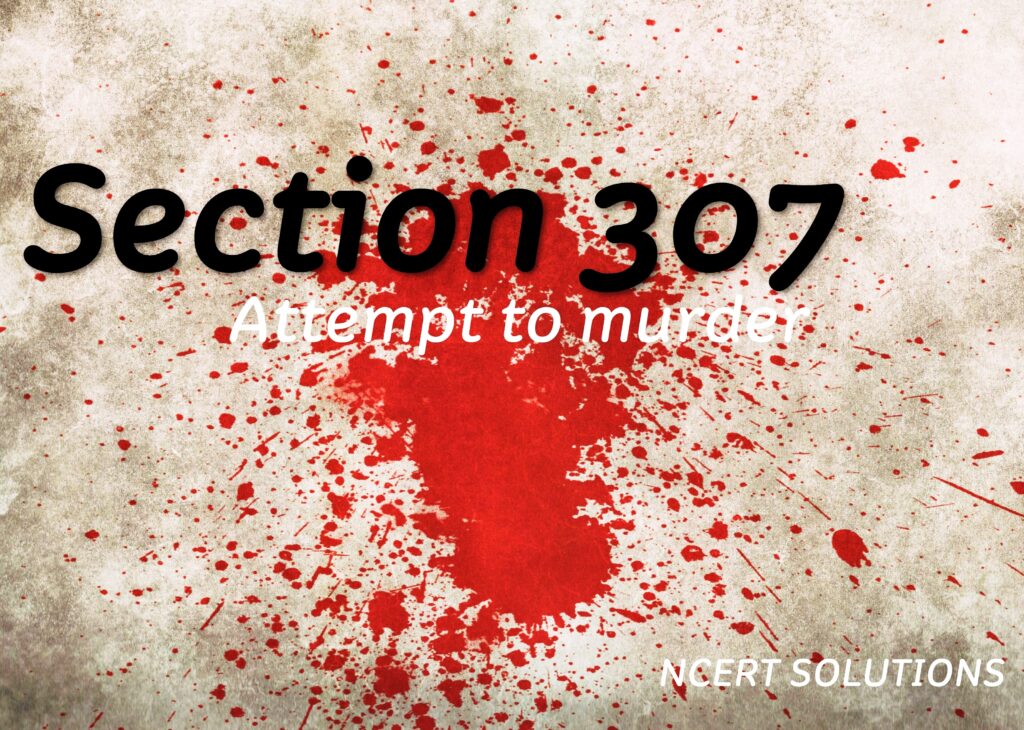In the realm of criminal law, Section 307 of the Indian Penal Code (IPC) stands as a crucial provision addressing the offense of attempting to commit murder.
This blog post aims to demystify this section, providing a comprehensive overview of its meaning, implications, and legal nuances.
Related: What is Article 370? Jammu and Kashmir
Illustration
- Let’s assume there are two persons A and Z. To kill Z, A would fire at him under such circumstances that A would have been guilty of murder if he had died. A is punishable under this section.
- A, to cause the death of a child of tender age, leaves him unprotected in a deserted place. A has committed the offense defined by this section, though the child does not die as a result.
- A, intending to kill Z, buys and fills a firearm. A has not committed the offense yet. A fires a gun at Z. He has committed the offense defined in this section, and if he thereby injures Z by shooting, he is punishable with the punishment provided by the latter part of the first paragraph of this section.
- A, intending to kill Z by poison, buys the poison, and mixes it with the food that A keeps with him; A has not yet committed the offense defined in this section. A puts the food on Z’s table or delivers it to Z’s servants to be laid on Z’s table. Then A would be deemed to have committed the offense defined in this section.
Meaning and Explanation of Section 307
Often some such sections are heard in the newspapers which are quite famous, one of those sections is Section 307 of the IPC, 1860, in which the provision of punishment has been given to a person for attempting to murder another person.
If you understand the provisions of this section in simple language, then it has been told that – If any person tries to kill any other person, but the person who has been attacked does not lose his life, then in such a case the attacker is prosecuted according to section 307.
Whenever any act is done by any person under various circumstances with such intention or perception or state of mind as to cause the death of another person, he shall be guilty of murder and shall be punished with imprisonment of either description for a term which may extend to 10 years, and shall also be liable to fine.
Also, now if any person is hurt by such an act, then the offender will be punished with life imprisonment or such punishment as mentioned here.
An attempt by an offender sentenced to life imprisonment: If the offender who has been sentenced to life imprisonment under this section causes hurt, he may be punished with death. The provision of punishment for an attempt to murder will be 10 years imprisonment along with a fine.
This offense is a non-bailable offense. If any person is hurt by such an act, the punishment shall be imprisonment for life or imprisonment of 10 years and a fine.
Punishment for causing hurt to someone in an attempt to murder by a life-imprisoned criminal: Death penalty or 10 years imprisonment and also fine, let us tell you that this offense is not compromising.
What will be the punishment under section 307 of the IPC?
Section 307 of the IPC provides for very harsh punishment if the accused is found guilty of an attempt at murder. If a person attacks another person with the intention of killing him, and for some reason, that person escapes, the person who commits the assault may be sentenced to imprisonment by the court.
In this, the sentence can be extended up to 10 years. Also, the guilty can also be punished with financial punishment, the court decides the monetary punishment by looking at the depth of the offense and the status of the guilty.
A further fact was added to Section 307 of the IPC, that if a person attempts to commit murder, who has already been sentenced to life imprisonment for any offense, such person shall be punished for the offense committed by him.
If any person attacks any other person in such a way as to cause serious injury but the person who kills does not intend to kill that person, then, in that case, the guilty shall be punished under section 307 of the IPC. Punishment is given in accordance with 325.
Provision of bail in section 307 of IPC
This offense is non-bailable in nature. However, some exceptions are made in the provision according to which an accused can get bail if there is a serious emergency in his house.
The High Court, by using its discretion can consider the bail application of the accused. Section 307 in IPC and CrPC does not provide for the grant of anticipatory bail to any person.
The offense described in Section 307 of the IPC is a non-bailable offense which means that bail is not available.
You have got complete information about section 307 of IPC through this article here, if you still have any doubts related to this section or want to get any other information related to it, then you can feel free to ask us.
